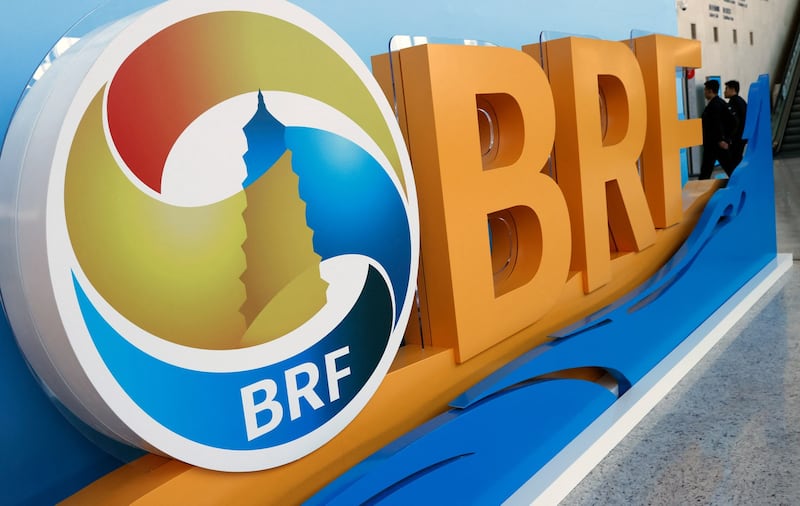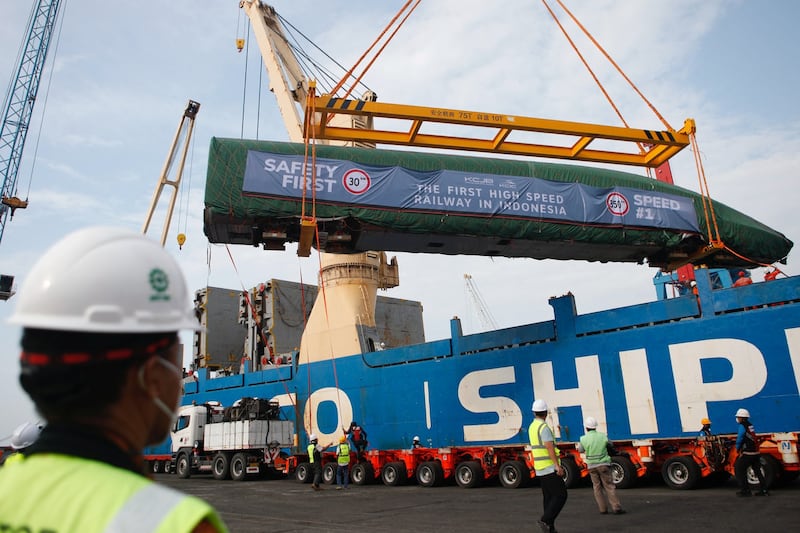China has defended its Belt and Road Initiative after Italy formally informed Beijing of its decision to leave the infrastructure project.
Responding to a question about the withdrawal, Chinese foreign ministry spokesperson Wang Wenbin said at a press briefing on Thursday in Beijing that "China firmly opposes attempts to smear and sabotage Belt and Road cooperation or stoke bloc confrontation and division" without naming any country.
It is unclear whether the statement was directed at Italy or a third party that, in Beijing’s opinion, may have interfered to dissuade Rome from participation.
Also on Thursday, Chinese leader Xi Jinping, addressing broader relations between China and the European Union during a summit with top EU officials in Beijing, said that the two sides should be partners and “eliminate all kinds of interference.”
The first in-person EU-China summit in four years aimed to promote "constructive and stable EU-China relations," according to an official statement.
Lack of tangible benefits
Italian Prime Minister Giorgia Meloni in her first public comments on leaving the BRI said “The tool of the [BRI] ... has not produced the results that were expected.”
Italy exported 16.4 billion euros (US$17.7 billion) worth of goods to China last year but imported 57.5 billion euros ($62 billion) of China-made products, making a large deficit, according to official data.
Meloni was speaking to reporters in Rome on Thursday after media reports that her government had formally notified Beijing of the decision earlier this week.
"I think that we should ... improve our cooperation with China on trade [and] the economy," Reuters quoted the prime minister as saying.

Italy joined China's mega scheme in 2019, the only member of the Group of Seven major developed economies, or G7, to do so. At the time, the United States warned Rome that "the Chinese Communist Party is trying to leverage its economic presence in Italy to serve its own strategic purposes."
Italy’s BRI membership expires in March, 2024, and Meloni had indicated that she wanted to leave.
“This decision was largely expected for months and was only a matter of time,” said Filippo Fasulo, a political scientist from the Italian Institute for International Political Studies (ISPI) in Milan.
“In the last months, negotiations have been underway to understand the best way to terminate the agreement without causing diplomatic clashes,” Fasulo, co-head of the think tank’s Geo-economics Center, told Radio Free Asia.
A Chinese geopolitical commentator agreed that the move, while significant, “was not entirely unexpected due to Italy’s growing skepticism about the tangible benefits from the deal.”
“Italy’s decision to leave the BRI aligns with Prime Minister Giorgia Meloni's critical view of the partnership and broader Western concerns about Beijing's influence,” said Andy Mok, a Senior Research Fellow at the Center for China and Globalization in Beijing.

This year marks the 10th anniversary of the BRI – Xi Jinping's signature mega project.
China said it has benefited more than 150 countries in the world with infrastructure contracts worth over US$2 trillion to develop projects such as seaports, railways and bridges. Critics meanwhile accuse Beijing of setting up debt traps and expanding geopolitical and economic influence.
Restarting the relationship
“China may react to Italy's exit with skepticism, but a complete breakdown in bilateral relations seems unlikely,” said Mok.
“Italy's strategic approach in exiting the BRI, aimed at maintaining political dialogue, suggests a cautious balance to avoid severe economic retaliation from China,” the political commentator added.
“High-level diplomatic engagements and efforts to balance Italy's geopolitical stance indicate a continued interest in a robust, albeit recalibrated, relationship with China.”
Filippo Fasulo from Italy’s ISPI said that he would not expect Beijing to respond with serious punitive economic measures.
“Italy and China had consultations before this decision and it is not in the interest of China while attempting to improve its relations with the EU to retaliate against one of its principal members,” he said.
He also noted that there are “signals,” like the decision by Chinese authorities to waive visitor visas for Italian citizens as of Dec. 1, that indicate the main differences between the two governments might have already been settled.
In the Italian expert’s opinion, “Italy’s participation, even if ineffective, was highly politicized and symbolic.”
However, the country needs to maintain the relationship with the world’s second largest economy.
“Now, it is possible to restart this relationship, as other countries are doing, bearing in mind the context of the great power competition and Italy's network of alliances,” Fasulo said.
The EU said in a statement after the Dec. 7 summit with Xi Jinping that China is the bloc's major trading partner but "the relationship is critically and structurally imbalanced."
“The EU stressed to China the importance of achieving a more balanced economic relationship with a level playing field and reciprocity,” it said. “The EU does not intend to decouple or to turn inwards.”
Andy Mok in Beijing said “Europe’s initial declaration to decouple from China was a fantasy.”
“‘De-risking’ is a flawed political compromise. But strategic interdependence is a historic inevitability,” he noted.
Edited by Mike Firn and Taejun Kang.
